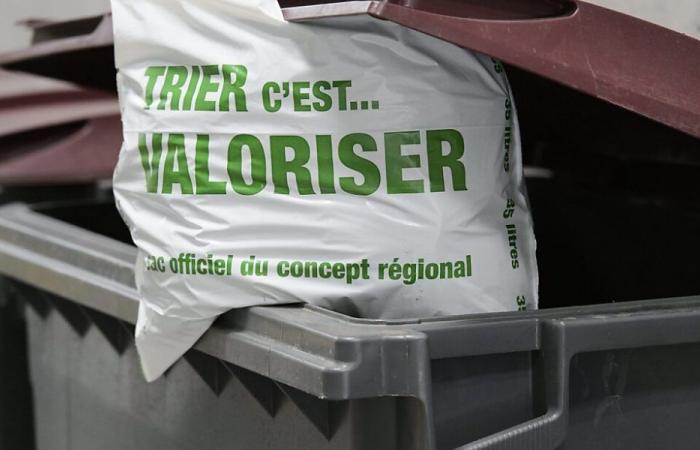The Vaud Court of Auditors criticizes the regional system of bag tax and garbage disposal. In an audit published Wednesday, it considers it necessary to rethink governance and harmonize management to limit the risk of errors. The Court also notes that the “polluter pays” principle is not respected. It makes a total of 24 recommendations.
“It is an extraordinary audit due to the number of entities audited and sessions, due to the length of the investigation”, did not hide the vice-president of the Court of Auditors Valérie Schwaar from the media. “This is an extremely complicated area and it is difficult for municipalities to understand all the subtleties of the system,” she summarized.
In short, “it is a system completely devoid of a pilot”, affirmed the magistrate. She recalled that in the canton of Vaud, waste disposal was delegated to the municipalities. The latter are divided into nine waste management areas (in the form of limited companies or inter-municipal collaborations) responsible for coordination between them. They therefore correspond roughly to the ten districts of the canton.
More than 30 million per year
At the end of 2023, more than 85% of the Vaud population, spread across 237 municipalities (out of 300 in total), uses the “Sorting is recycling” garbage bags offered by the regional bag tax system (TAS) . Introduced in 2013, it collects a total amount of more than 30 million francs annually, intended to finance garbage disposal, explained Ms. Schwaar.
Its goal is the sale of uniform taxed bags at a single price and the retrocession of the tax to member municipalities based on the weight of the garbage collected. Its implementation is ensured by a College of Presidents and its Financial Unit, bodies made up of representatives of six areas participating in the system and by the Tridel incineration plant, in Lausanne, mandated as service provider.
At the cantonal level, the Department of Youth, Environment and Security (DJES) exercises high policing in this area, while the General Directorate of the Environment (DGE) is responsible for executing the all of environmental law, which includes waste management.
Conflicts of interest?
The Court of Auditors has identified several problems and dysfunctions. Although the College of Presidents guarantees the proper functioning of the entire system and is competent to make strategic decisions, it does not consider itself a governing body. It has, in fact, no existence in the legal sense. It is the agent Tridel who collects the proceeds of the tax from the bag manufacturer, notes the audit.
“There is therefore a centralized lack of strategic vision, management and monitoring of the system. There is also a risk of conflicts of interest, because Tridel sits on the College of Presidents and several presidents are on the Board of Directors of Tridel”, notes Ms Schwaar. She also emphasizes that the convention establishing the bag tax is no longer up to date and that the price of the bag has never been reevaluated.
Although the six perimeters aim for harmonized management of the system, the Court notes that each municipality does not benefit from an identical amount returned per tonne of waste. She also notes that “the risks of errors in the distribution of the tax to the municipalities are not sufficiently managed”.
Canton also pinned
The canton, via the DJES, is also pinned. “While it is up to the DJES, responsible for the high police, to play a regulatory role and control practices, it does not ensure the proper application of the legal and regulatory framework by the municipalities through periodic controls He has no visibility on the TAS system,” writes the Court.
She also observes that public administrations are not systematically billed for their urban waste. Therefore, the “polluter pays” principle is not applied to these entities. “The costs of disposing of this waste are therefore passed on to the people and businesses subject to the taxes.”
Urban waste management must be financed exclusively through taxes and should therefore be a self-financing area. The Court notes, however, that five of the six municipalities audited use tax revenue to finance the management of this urban waste.
The Court makes seven recommendations to the College of Presidents, which refuses two of them. Eight recommendations are made to the six municipalities audited. Only one municipality refuses one. Seven recommendations are addressed to the DGE, which accepts them all, and two to the DJES, which refuses one.
Yann Rossier with Keystone ATS






